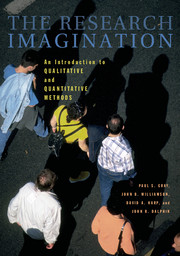Book contents
- Frontmatter
- Contents
- Preface
- 1 RESEARCH PROCESS
- 2 THEORY AND METHOD
- 3 RESEARCH DESIGN
- 4 MEASUREMENT
- 5 ETHICAL AND POLITICAL ISSUES
- 6 SAMPLING
- 7 SURVEY RESEARCH
- 8 INTENSIVE INTERVIEWING
- 9 OBSERVATIONAL FIELD RESEARCH
- 10 FEMINIST METHODS
- 11 HISTORICAL ANALYSIS
- 12 EXPERIMENTAL RESEARCH
- 13 CONTENT ANALYSIS
- 14 AGGREGATE DATA ANALYSIS
- 15 COMPARATIVE RESEARCH METHODS
- 16 EVALUATION RESEARCH
- 17 INDEXES AND SCALES
- 18 BASIC STATISTICAL ANALYSIS
- 19 MULTIVARIATE ANALYSIS AND STATISTICAL SIGNIFICANCE
- EPILOGUE: THE VALUE AND LIMITS OF SOCIAL SCIENCE KNOWLEDGE
- Appendix A A Precoded Questionnaire
- Appendix B Excerpt from a Codebook
- Author Index
- Subject Index
- References
Preface
Published online by Cambridge University Press: 05 June 2012
- Frontmatter
- Contents
- Preface
- 1 RESEARCH PROCESS
- 2 THEORY AND METHOD
- 3 RESEARCH DESIGN
- 4 MEASUREMENT
- 5 ETHICAL AND POLITICAL ISSUES
- 6 SAMPLING
- 7 SURVEY RESEARCH
- 8 INTENSIVE INTERVIEWING
- 9 OBSERVATIONAL FIELD RESEARCH
- 10 FEMINIST METHODS
- 11 HISTORICAL ANALYSIS
- 12 EXPERIMENTAL RESEARCH
- 13 CONTENT ANALYSIS
- 14 AGGREGATE DATA ANALYSIS
- 15 COMPARATIVE RESEARCH METHODS
- 16 EVALUATION RESEARCH
- 17 INDEXES AND SCALES
- 18 BASIC STATISTICAL ANALYSIS
- 19 MULTIVARIATE ANALYSIS AND STATISTICAL SIGNIFICANCE
- EPILOGUE: THE VALUE AND LIMITS OF SOCIAL SCIENCE KNOWLEDGE
- Appendix A A Precoded Questionnaire
- Appendix B Excerpt from a Codebook
- Author Index
- Subject Index
- References
Summary
Science is a Blueprint for Research; Imagination gives Research its Life and Purpose.
These ideas have inspired us to write this book about research methods. After decades of experience in planning and carrying out social research projects of all kinds, we are convinced that research is indeed a craft requiring judgment and creativity, not simply learning the rules of science and applying them. Whether one is doing the most intimate one-on-one interviewing or large-scale examinations of how entire societies make public policy, human imagination and scientific principles of inquiry go hand in hand. To that end, this book emphasizes scientific method but also acknowledges its critics. It covers a wide variety of data collection techniques but presents them as reinforcing, rather than competing with, one another.
A Balance between Qualitative and Quantitative Methods
This is a book for students and instructors who want a comprehensive treatment of a variety of research techniques but with special attention to qualitative approaches. We are committed to a balanced approach that gives a variety of qualitative methods full exposure alongside more mainstream quantitative strategies. Joe R. Feagin, a past president of the American Sociological Association, has commented on the almost exclusively quantitative emphasis of articles accepted for publication in leading sociology journals. He has advocated more realism in recognizing the methodological diversity within the discipline. Feagin (1999) also noted that many sociologists who study, for example, race, ethnicity, gender, class, and sexuality oppose a heavy emphasis on quantitative social research.
- Type
- Chapter
- Information
- The Research ImaginationAn Introduction to Qualitative and Quantitative Methods, pp. xix - xxiiPublisher: Cambridge University PressPrint publication year: 2007



